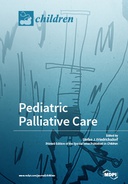Explore

Pediatric Palliative Care
0 Ungluers have
Faved this Work
Login to Fave
At least 20 million children worldwide would benefit from Pediatric Palliative Care (PPC) annually, and eight million children would need specialized PPC services. In the USA alone, more than 42,000 children, 0–19 years, die annually; fifty-five percent of them are infants younger than one year old. Interdisciplinary PPC is about matching treatment to patient goals and is considered specialized medical care for children with a serious illness. It is focused on relieving pain, distressing symptoms, and stress from a serious illness and is appropriate at any age and at any stage, together with curative treatment. The primary PPC goal is to improve the quality of life both for the child and for his/her family.Sadly, advances in the control of symptoms in children dying of life-limiting diseases have often not kept pace with treatment directed at curing the underlying disease. Data reveal that the majority of distressing symptoms in children with an advanced serious illness (such as pain, dyspnea and nausea/vomiting) are not treated, and, when treated, therapy is commonly ineffective. Emerging evidence shows that palliative care involvement results in improved quality of life, as well as prolongation of life.High-quality pediatric palliative care for children with serious illnesses is now an expected standard of medical care. However, there still remain significant barriers to achieving optimal care, related to lack of formal education, reimbursement issues, the emotional impact of caring for a dying child, and most importantly, the lack of interdisciplinary PPC teams with sufficient staffing.Fortunately, considerable advances have been made in recent years providing PPC around the globe both in resource-poor and resource-rich countries through care provided at children’s hospitals, outpatient palliative care clinics, palliative home care, and free-standing children’s hospice houses. This book, authored by leading authorities in the field, is dedicated to describing existing gaps, as well as the achievements made in clinical care, education, training, and research.
This book is included in DOAB.
Why read this book? Have your say.
You must be logged in to comment.

